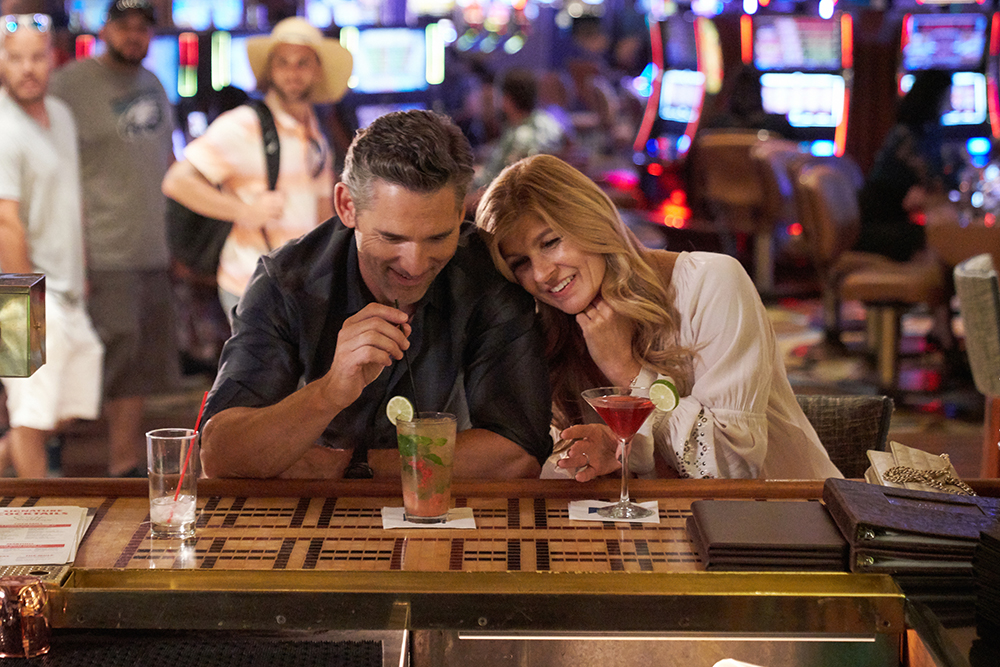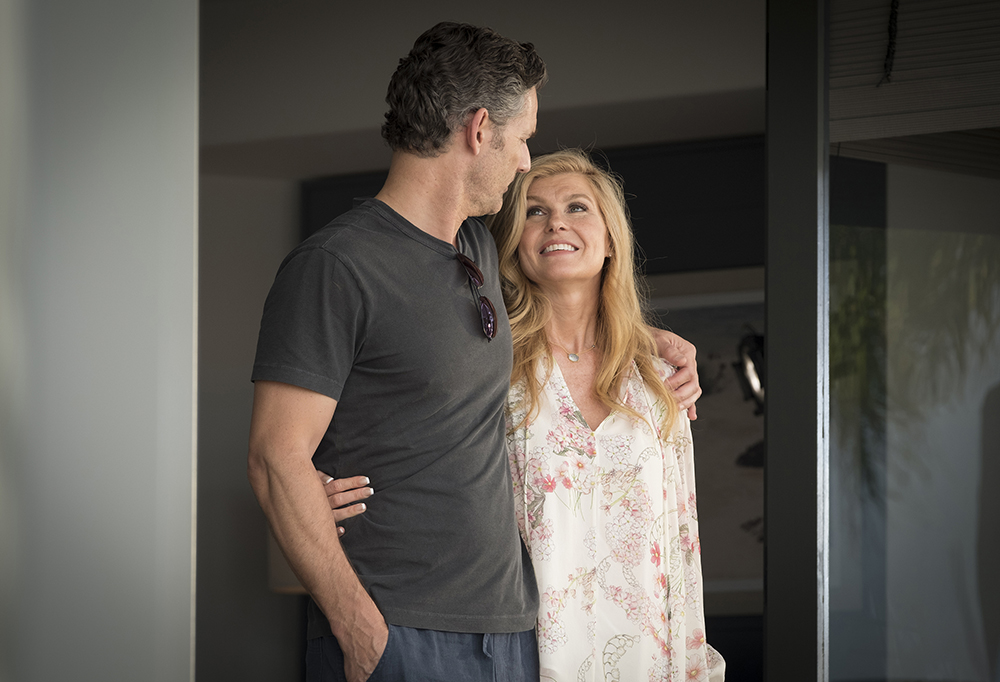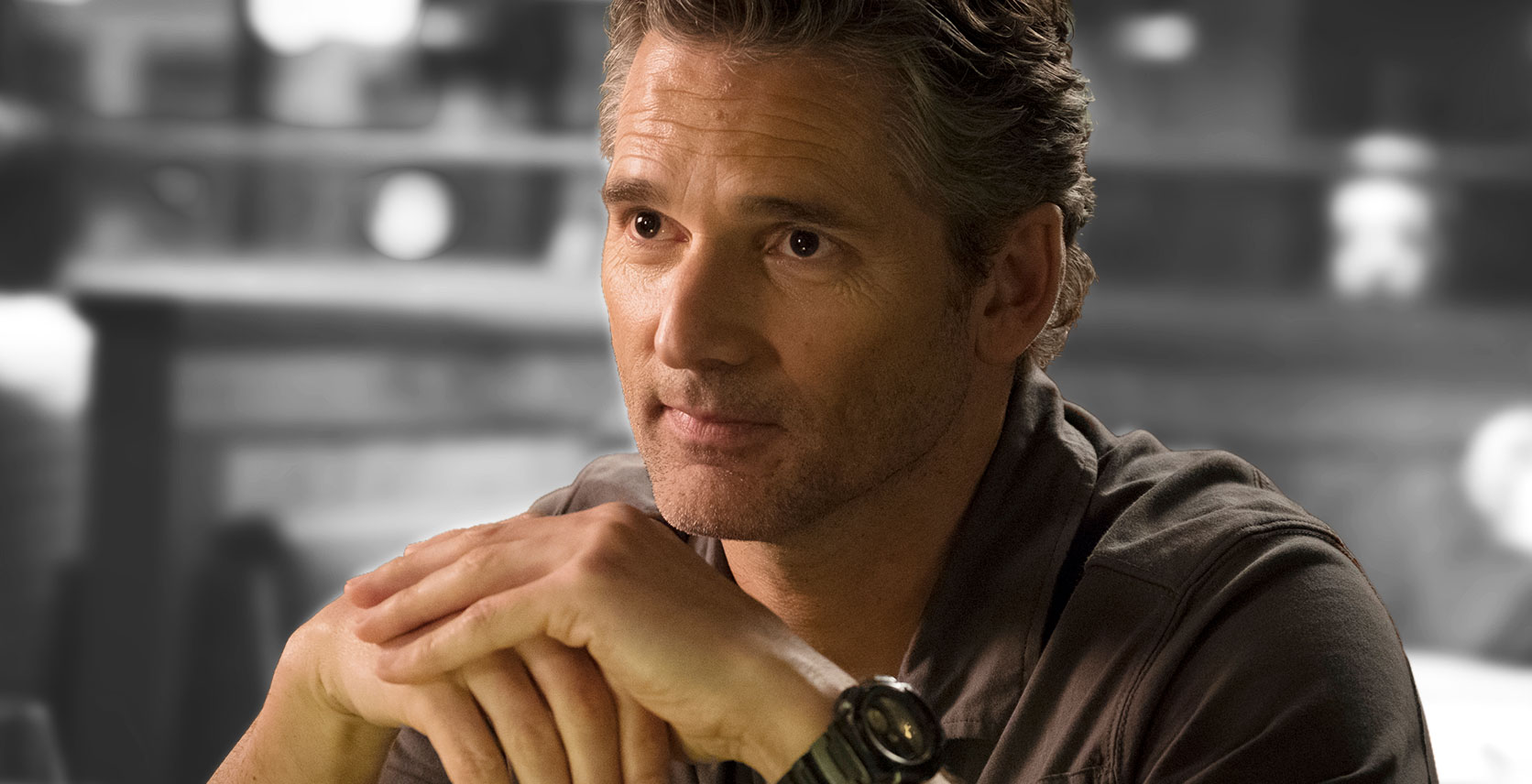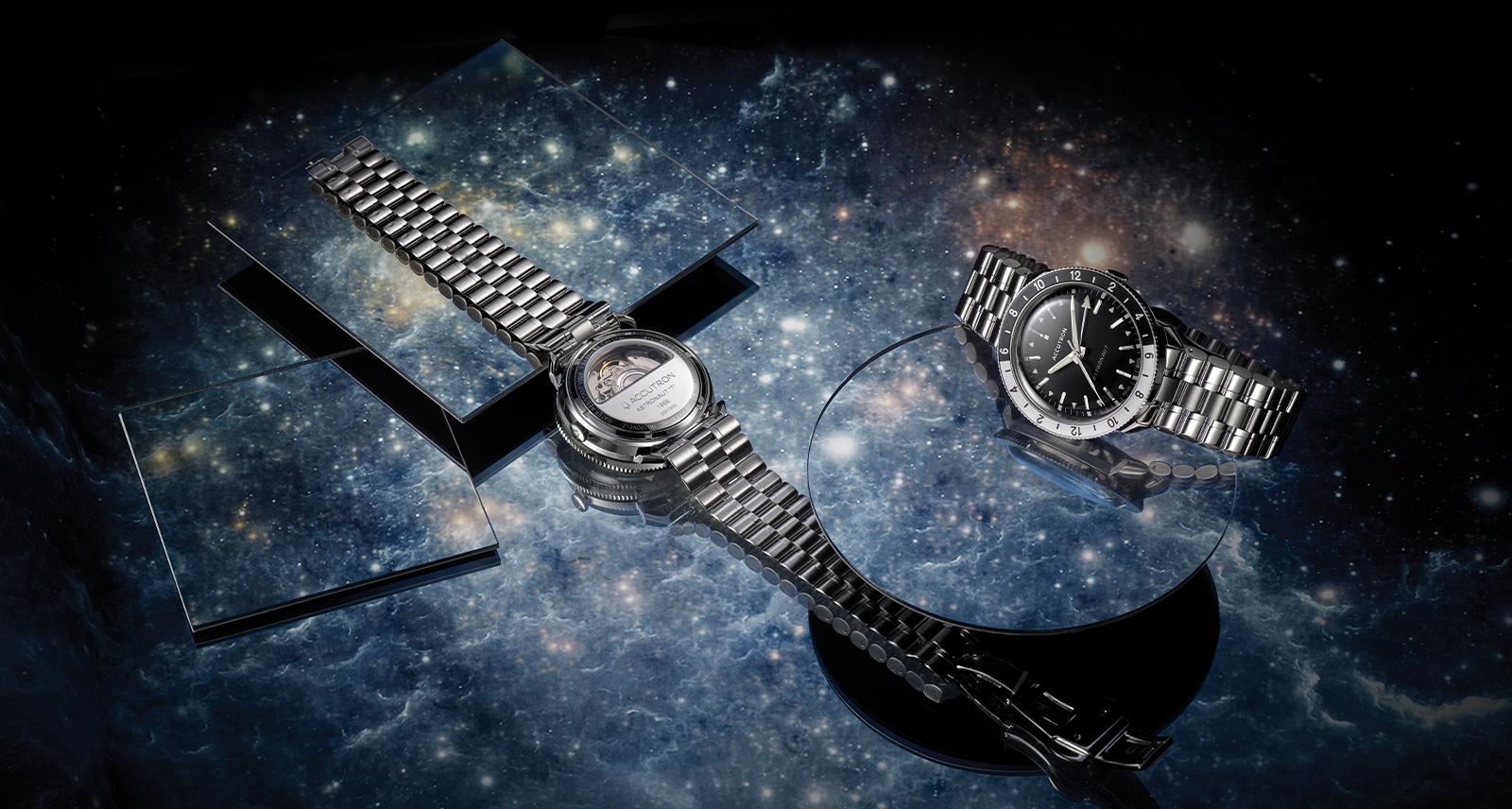Eric Bana on ‘Dirty John’ and the Internet’s Bizarre Thirst for Creepy Men
It’s been a good year for bad men (who aren’t named R. Kelly). You may have noticed, for instance, that the internet’s developed something of a crush on Ted Bundy ever since Netflix dropped its docu-series on the notorious murderer, Conversations with a Killer: The Ted Bundy Tapes. (It got so bad the streaming service had to implore the public to quit thirsting for him.) There’s also been some collective gushing over Joe Goldberg, the stalker-turned-serial-killer in Netflix’s other popular release, You (which just got renewed for a second season). And now, it would seem the world wide web’s got a new batshit crazy boyfriend: John Meehan, the real-life sociopathic grifter Eric Bana plays on the true crime show Dirty John (out now on, you guessed it, Netflix).
Dirty John — which sounds like it’s about an unsanitary toilet, but isn’t — is an eight-part series based on a wildly popular podcast (itself inspired by host Christopher Goffard’s series of L.A. Times articles) about one bad hombre (John) who manipulated a crazy rich woman he met online (interior designer Debra Newell) as part of a long con with an extremely gruesome climax. Bana is reliably unsettling as Meehan, equal parts creepy and charming, and makes you never want to trust a middle-aged, cargo short-wearing white man ever again. In other words, he’s exactly the kind of guy the internet would aggressively swipe right for.
We caught up with Bana to chat about sociopaths, the internet’s strange infatuation with them, and how to know if you’re on a date with one.
Hey Eric! How’s your day been going?
Ah, it’s morning over here, so it’s just getting started.
You got your Dirty John-esque morning smoothie to get you going?
Nah, no smoothie, man. But ready to go just the same. [Laughs.]
Right on. Okay, first off, let me just say: you are straight-up disturbing in this role. What made you want to play a deranged, manipulative sociopath?
Well, just selfishly as an actor, these are the sort of roles that we fight for. I was fascinated by John. I’ve played characters who have sociopathic tendencies in the past and I’m fascinated by them. I was excited by the fact that in the podcast, whilst it’s really about John Meehan and his manipulation of Debra, we don’t really get a full sense of him. And so, I felt it was a really great opportunity to flesh out a character that people sort of thought they knew about but didn’t really.
What a curious thing to say: you’re fascinated by sociopaths. What is it about them?
I guess they play by a different set of rules to the rest of society, so I think that’s where part of our fascination lies. And, as an actor, it’s a great challenge to play because there’s so many different levels and nuances of their behaviour that doesn’t necessarily exist in a normal character. So, from a selfish, acting point of view, it’s a bit of a smorgasbord, particularly if you’re then working closely with the writer and the director in terms of best facilitating that opportunity.
To get inside John’s mind, do you find yourself having to empathize with him? Or see where he’s coming from?
That’s a good question because one of the first things we do, as actors, is we try to empathize with our characters in order to portray them and so forth. I — for the first time in many, many, many years — realized early on in my research that there was not a lot of empathy for this character on my behalf, but there was a fascination. So I was able to do away with the normal weight of empathy that I would have for a character and instead concentrate on what’s accurate and truthful to that personality type, because this series is crazy, right? What happens is absolute insanity. So, the most important thing for me was making sure that through all this craziness and chaos, you totally believe John. The minute we don’t believe him as a real character, we’re in a lot of trouble.
“You’re always allowing part of your brain to think as your character would, or at least I do… You’ve just got to make sure you don’t act on any of it.”
What kind of effect does playing such a deranged guy for many hours have on you? Did you find it starting to infect your mind?
Oh, most definitely. In many ways. I mean, it can change your thought patterns. Part of your job, I guess, is you’ve got to give part of your brain over to the character you’re playing, whilst you switch off at the same time. You’re always allowing part of your brain to think as your character would, or at least I do. So you then start creating a bit of a synapsis in your brain and there’s some thought patterns that are similar to the character you’re playing. So, yeah it definitely affects your mind. That’s part of the privilege, I guess, of the job. You’ve just got to make sure you don’t act on any of it. [Laughs.]
How do you cleanse yourself of it afterwards? Do you have a cleansing ritual?
It’s just time, you know? I get on my motorbike and get back into home life. It’s just really about coming back home to Australia and going about my normal routine. That’s the normal cleansing process. I mean sometimes [the characters] hang around. Sometimes it takes longer than others.
Is John still with you now? Or have you gotten him out of your system?
I think I have. But the other day, someone told me I was talking rudely when I didn’t think I was. [Laughs.] So who knows!
I’m not sure if you’ve noticed, but lately on the internet there’s been this strange phenomenon of millennials finding sociopaths and serial killers “sexy.” And it’s been happening with dudes who just so happen to be on Netflix: Ted Bundy and Penn Badgley’s stalker character in You. I have a feeling Dirty John might be the internet’s next big crush. How do you explain this trend?
Ah, well look, I’m old. I’m 50. So, I got news for you: it’s nothing new. [Laughs.] I remember being a teenager and being fascinated by these sorts of characters. And it was no different, you know, 30 or 40 years ago. So, I don’t think it’s a new thing. You know, I think people were fascinated by Charles Manson back in the day and they were fascinated by all these crazy personalities that sit on the other end of our moral compass. I think it’s always challenging to people, and also fascinating.

I wonder what the appeal is, really. Some say it’s the idea that even evil, morally bankrupt men can be saved, and all they need is the love of a good woman.
[Laughs.] It’s a good point. I remember saying to a couple of people when I was working on the show, “I’ll tell you what, if I had shares in a dating site, I’d be selling them.” And then I thought, “You know what? No, this show might actually drive people to do the opposite to what you think.” That’s what’s fascinating about the storyline of this show. I can imagine there are some people out there who would watch it and go, “I’m gonna get myself online and try and find someone!” Sometimes people respond way differently than how you imagine they will. But you’re right, and it’s what allows so many women to be in judgment of Debra — it’s the thought that this could never happen to them and that they’d have a different set of powers that would be able to detect what was going on with John earlier. They think they’d be able to extricate themselves much quicker. I think we’re constantly in this cycle of judging other people on the basis that we would perform better in the same set of circumstances.
Were you guys concerned about glamorizing John too much? Were you worried people might get the wrong idea and find him hot and studly?
No! I mean, if we were doing our job that should be the case. You know, the idea is that these people don’t present as monsters, they present as the opposite! So, whilst obviously sometimes the mask slips and you see the unmistakably ugly side to him, you should also see that when the mask is on, he’s completely capable of charming anyone. People assume with these types of characters that if you scratch the surface their story will — you know, it’s like a game of KerPlunk and it will fall apart. That’s not really the case. You know, these people have meticulous attention to detail on their backstory and it just disarms people. It’s like, “Wow, he just talked about his favourite drink at a bar that he used to go to when he was in college. Well, clearly he went to that bar and went to that college! That’s an amazing bit of detail he remembered!” These people who can manipulate and scam have a lot of practise.
Now that you’ve spent so much time being inside the mind of one of these guys, tell me: what are some of the red flags people should look for when dating someone they just met online?
Yes, I’m glad you asked. Okay, so number one: the inability to corroborate anything he’s saying with another human being. That is the biggest red flag. Meticulous attention to detail on backstory, and an unusual number of deaths in the family, which means there’s no one present in their life. They’ve always moved; they’re never from the city they’re in, because that’s the first thing: you can’t be from that city because that’s the only reason you don’t have friends and family in that city. You know, these are pretty consistent themes that some of these characters have.

And I guess your date showing up in cargo shorts would be the second biggest red flag.
[Laughs.] Minor slip, minor slip. Hey, we can all make that mistake, you know? We’re just one bad wardrobe choice away from judgment.
I’m a big proponent of cargo short. I feel like they get a bad rap as it is. So, I got a bit offended that they were such an integral part of John’s look.
I’ve even started getting paranoid pulling out polo shirts. So I understand. I can’t give up on the polo shirt just because of John!
John, clearly, was a very obsessive person. What’s something you’ve been obsessed with lately?
Look, there’s always stuff you’re working on in the background that you’re obsessing about. I think it’s probably just human nature. As actors, I think we do tend to obsess over detail on whatever it is we’re working on. I’m in preproduction now for something I’m going to start shooting very soon. I guess it’s a process that kind of repeats itself. And for me, it’s not just about the character — it’s about the whole world, trying to look at it from above. I enjoy getting obsessed with the minutiae of detail on my character but I also really like knowing a lot about the broader picture of the production. So, I’m a camera buff. I love the look of how films look. And so, I do tend to obsess over that.
And what is it that you’re working on?
It’s an adaptation of an Australian novel called The Dry by Jane Harper, which was a huge, huge book. iI’s a thriller set in a country town in rural Australia about a murder-suicide. It was a really large-selling book, and it was picked up by Bruna Papandrea, who produced Big Little Lies. So Bruna, myself, and Rob Connolly, the director, have all known each other a long time. Bruna came and asked Rob if he was interested in directing. He’s an old partner of mine, so we got together. We’re excited.










